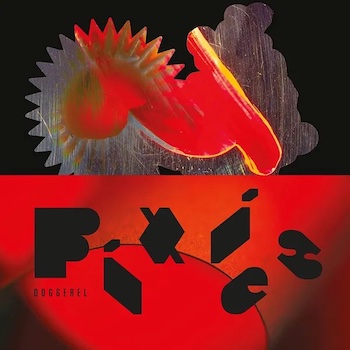Rock Album Review: The Pixies — Spiky Sonics, Smoothed Over
By Matt Hanson
The Pixies could be anthemic, snarky, jaunty, or forlorn as they chose, which meant they were never boring.
 The Pixies hit me right between the eyes when I first heard them, back in high school in the mid-’90s. For a band that never seemed to care too much about catering to the mainstream they inspired everyone from David Bowie to Kurt Cobain to The Bad Plus and helped put Boston’s alternative culture on the map. Those whisper-to-a-scream vocal detonations, dissonant guitar riffs, surreal, biblically inflected lyrics, and the haunting shadow play of Black Francis and Kim Deal’s vocals roiled with subversive panache. The Pixies could be anthemic, snarky, jaunty, or forlorn as they chose, which meant they were never boring.
The Pixies hit me right between the eyes when I first heard them, back in high school in the mid-’90s. For a band that never seemed to care too much about catering to the mainstream they inspired everyone from David Bowie to Kurt Cobain to The Bad Plus and helped put Boston’s alternative culture on the map. Those whisper-to-a-scream vocal detonations, dissonant guitar riffs, surreal, biblically inflected lyrics, and the haunting shadow play of Black Francis and Kim Deal’s vocals roiled with subversive panache. The Pixies could be anthemic, snarky, jaunty, or forlorn as they chose, which meant they were never boring.
Doggerel, their new record, isn’t up to par with their earlier work, which is not to say that it’s bad — if anything, it’s a mellower, tamer version of a band that once felt so frenzied and desperate. This is understandable, given that we’re a long way from their late ’80s/early ’90s heyday, but Doggerel has its most memorable moments when it connects to the band’s essential volatility.
The opening track “Nomatterday” still has a residue of the old swagger, with Black Francis yowling and sneering like he used to. He has always had this uniquely declarative way of speak-singing, like he was reading something that written in all capital letters, which helps to get those absent-minded lyrics across. I’m not sure who he’s supposed to be referring to, if anyone, when he starts talking about being an irritant and admonishing someone “not to piss in the fountain.” The lead track is tuneful while refusing to color within the lines, which is part of why their followers love them.
You can glimpse the skeletal outline of the classic Pixies style in most of Doggerel’s first half. “The Vault of Heaven” takes a diffident approach to the usual rock songwriting format. It’s got a brooding verse and a big, bellowing chorus, as does “Haunted House,” where Paz Lenchantin’s fine backing vocals are a near approach to Kim Deal’s. Apparently the infamous rift between Francis and Deal remains in place. I suppose that can’t be helped, but Deal’s voice contributed a depth of troubled tone that is missed.

The Pixies.
The problem is that most of Doggerel’s material doesn’t add much to the band’s sonic palate. Sure, they can’t be expected to still be the scrappy bunch of misfits they used to be, but Doggerel doesn’t expand on what the Pixies already do very well. “Who’s More Sorry Now?” sounds like it could be an outtake from their mediocre record Bossanova. As much as my ears perk up over a biblical title like “You’re Such A Sadducee” I don’t really understand the point of choosing an intriguingly obscure term and then not doing anything interesting with it. The same goes for the clunky pair of lines in “Thunder and Lightning”: “There was a storm today in Chinatown/ My favorite vegetable was really coming down.” Wha? Obliqueness was one of the best tricks Black Francis had up his sleeve, but when nonsense doesn’t evoke anything enticing or compelling, that indirectness just lands flat.
At their best, The Pixies knew how to lodge their spiky sonics deep in your brain. They lingered there like sliced eyeballs, and the band made you like the violation. To be perfectly honest, I’ve given Doggerel about two weeks’ worth of consistent listening at this point, and I can’t say that I haven’t enjoyed it. Yet at the same time, every time I finish it I can’t remember much of what I’d just heard. And I have had the songs on repeat for days. The tunes are pleasant enough, but I can’t deny the dispiriting fact that they lack the old subversive spirit.
Matt Hanson is a contributing editor at the Arts Fuse whose work has also appeared in American Interest, Baffler, Guardian, Millions, New Yorker, Smart Set, and elsewhere. A longtime resident of Boston, he now lives in New Orleans.

Matt, while I didn’t agree with all of your opinions in the review, I did fully agree with some of them; I found the review to be a good read! Thank you. Like in music, writing about music requires no formal entry requirements, and as such people write all sorts of nonsense which sometimes is also not a good read. Anyhow, I thought I would at least illuminate with regard to your confusion of the couplet:
There was a storm today in Chinatown
My favorite vegetable was really coming down
While the words refer directly to the narrative of the song, it is also a cultural reference; The Beach Boys have a great record called Smile, and an earlier “bootleg” version of that record, Smiley Smile, also enjoys wide circulation. There is a number from the session with the repeated phrase “my favorite vegetable”. There are other pop culture references in this song and scattered throughout the whole of the record. The same is true of my entire repertoire.
double espresso and out,
BF